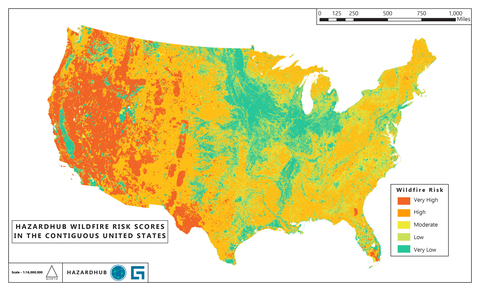HazardHub Provides Critical Wildfire Risk Data and Maps

HazardHub wildfire risk scores in the contiguous
Top States for Wildfire Risk
Guidewire HazardHub Enhanced Wildfire Risk Score data indicates that the top states for wildfire risk, based on the percentage of homes receiving an “F” rating for wildfire risk, are:
1.
2.
3.
4.
5.
The HazardHub Enhanced Wildfire Score leverages granular geographical data, updated vegetation data, proximity to fire hydrants and fire stations, historical wildfire data, and environmental factors to provide a detailed and accurate assessment of wildfire risk.
Number of Homes at High Risk from Wildfires
The top states by the number of homes at high risk of wildfire (rated as an “F” for wildfire risk) are:
1.
2.
3.
4.
5.
According to analysis by Guidewire HazardHub, wildfire risk mitigation and home hardening efforts can reduce the risk of wildfire damage by as much as
Top States for Wildfires
The western
The rugged terrain in many western states, such as mountainous regions, can facilitate the spread of wildfires. Steep slopes allow fires to move quickly uphill, and the remote nature of many areas can be a significant challenge for firefighting efforts. In addition, the vegetation found in the western states, including forests, shrublands, and grasslands, is highly flammable.
Historical wildfire data consistently show that the most significant and destructive wildfires tend to occur in the western
In 2023,
The Wildland Fire Interagency Geospatial Services dataset focuses on significant wildfire events, excluding more minor or less impactful incidents. State agencies, such as CalFire, tend to include all reported wildfires within their jurisdiction, including both significant and smaller incidents. Their data tends to be broader and includes more minor events.
According to a Guidewire HazardHub analysis, in
In 2023,
"Homeowners should aim to better understand their wildfire risk to inform their insurance coverage needs and implement effective mitigation strategies. Efforts such as creating a defensible space, and retrofitting homes with fire-resistant materials, windows, and vents can boost a home's resilience by as much as
The Enhanced Wildfire Score and other detailed HazardHub data and risk scores are accessible to insurers through Guidewire’s apps, including PolicyCenter and InsuranceNow, and via the HazardHub API. Consumers interested in learning about their home’s risks can visit freehomerisk.com.
About Guidewire
Guidewire is the platform P&C insurers trust to engage, innovate, and grow efficiently. We combine digital, core, analytics, and machine learning to deliver our platform as a cloud service. More than 540 insurers in 40 countries, from new ventures to the largest and most complex in the world, run on Guidewire.
As a partner to our customers, we continually evolve to enable their success. We are proud of our unparalleled implementation track record, with 1,600+ successful projects, supported by the largest R&D team and partner ecosystem in the industry. Our marketplace provides hundreds of applications that accelerate integration, localization, and innovation.
For more information, please visit www.guidewire.com and follow us on X (formerly known as Twitter) and LinkedIn.
View source version on businesswire.com: https://www.businesswire.com/news/home/20240821791009/en/
For more information and customized maps:
Melissa
Guidewire Software
+1 650-464-1177
mcobb@guidewire.com
climate@guidewire.com
Source: Guidewire







